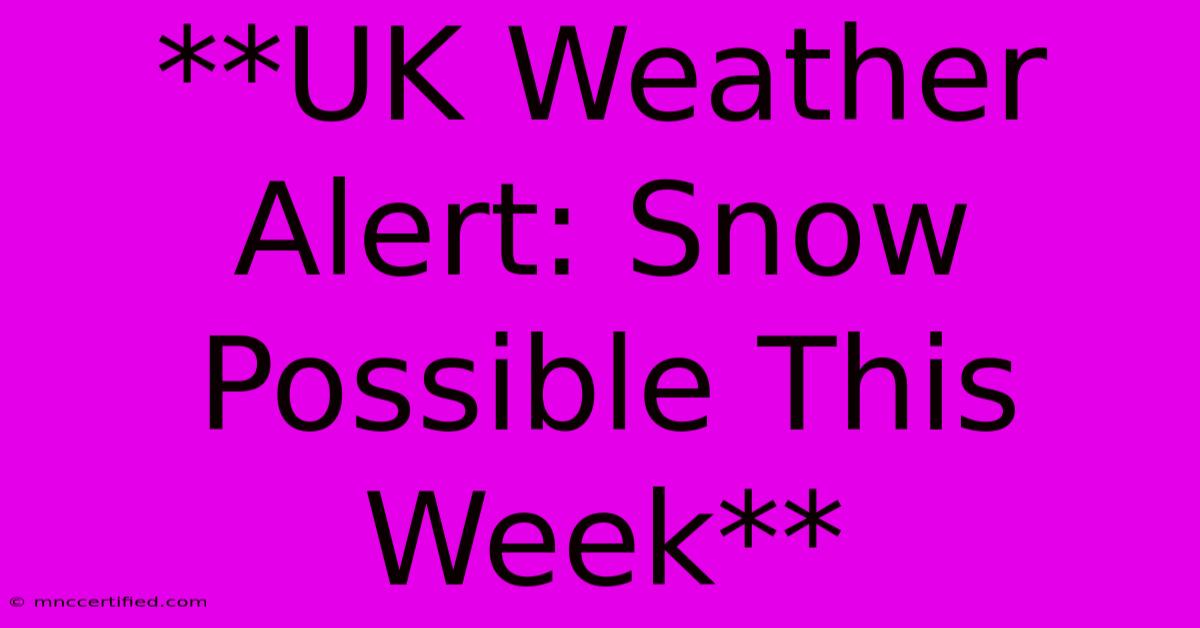**UK Weather Alert: Snow Possible This Week**

Table of Contents
UK Weather Alert: Snow Possible This Week
The UK is bracing itself for a potential wintry blast as weather forecasts predict the possibility of snow this week. While not a certainty across the board, several regions are on high alert, prompting warnings from the Met Office and calls for preparedness from local authorities. This article will break down the latest forecasts, affected areas, and essential advice for staying safe during potential snowfall.
Which Parts of the UK Could See Snow?
Predicting snowfall with complete accuracy is challenging, but current models suggest several areas are most at risk. The Scottish Highlands, known for their higher altitudes and propensity for early snowfall, are likely to see the most significant accumulation. Parts of northern England, particularly the Pennines, could also experience snowfall, potentially disrupting travel. Lower-lying areas are less likely to see significant snowfall, but wintry showers are possible across a wider swathe of the country, including parts of Wales and even some higher ground in the Midlands.
Stay Updated with the Met Office
For the most accurate and up-to-date information, regularly check the Met Office website and app. They provide detailed forecasts broken down by region, including snow warnings and severe weather alerts. Subscribing to their alerts can ensure you receive timely notifications about impending changes in weather conditions.
Preparing for Potential Snow
Even a light dusting of snow can cause significant disruption. Here's how to prepare:
- Check your travel plans: If you're planning a journey, especially by car, check the latest weather forecasts and road conditions before setting off. Many websites and apps provide real-time traffic updates, including information about snow and ice.
- Stock up on essentials: Ensure you have enough food, water, and medication to last a few days in case you're unable to leave your home.
- Prepare your home: Check your heating system is working correctly, and consider stocking up on extra blankets and warm clothing.
- Winterize your vehicle: Check your tyres, screen wash, and antifreeze levels. Keep a shovel, de-icer, and a warm blanket in your car in case you get stuck.
- Check on vulnerable neighbours: Make sure elderly or vulnerable neighbours are prepared and have access to the support they need.
What to Do During a Snowfall
- Drive carefully (if necessary): If you must drive, drive slowly, increase your following distance, and be aware of black ice.
- Stay indoors if possible: Avoid unnecessary travel during heavy snowfall.
- Dress warmly in layers: Multiple layers of clothing are more effective at trapping heat than a single thick layer.
- Be aware of potential hazards: Watch out for icy patches and falling snow from roofs and trees.
Keywords for SEO Optimization:
This article uses a variety of keywords naturally throughout the text to improve its search engine optimization. These include:
- Primary Keywords: UK snow, UK weather, snow forecast UK, snow alert UK, UK winter weather
- Secondary Keywords: Met Office, snow warning, winter weather preparation, travel disruption, Scottish Highlands, Pennines, wintry showers, road conditions, safe driving in snow
By strategically using these keywords and related terms, the article aims to rank highly in search engine results for relevant queries. Remember to also utilize long-tail keywords such as "what to do during a UK snowstorm" or "preparing my car for UK winter weather" to target more specific searches.
Off-Page SEO Strategies:
To further boost the article's ranking, consider the following off-page SEO strategies:
- Social Media Promotion: Share the article on relevant social media platforms, using appropriate hashtags.
- Backlinks: Encourage other websites and blogs to link to this article. This can be achieved through guest posting, outreach, and creating high-quality content that others want to share.
By combining on-page and off-page SEO techniques, this article aims to reach a wide audience and provide valuable information to those affected by the potential snowfall. Remember to always check the latest forecasts from reliable sources like the Met Office. Stay safe and warm!

Thank you for visiting our website wich cover about **UK Weather Alert: Snow Possible This Week**. We hope the information provided has been useful to you. Feel free to contact us if you have any questions or need further assistance. See you next time and dont miss to bookmark.
Featured Posts
-
Italy France Win Nations League Matchday 5
Nov 15, 2024
-
Highlight Hurts Scores On Brotherly Shove
Nov 15, 2024
-
Tate Mc Rae Xcel Energy Center
Nov 15, 2024
-
Infowars Sold The Onion Steps In
Nov 15, 2024
-
Venezuela Vs Brazil Where To Watch
Nov 15, 2024